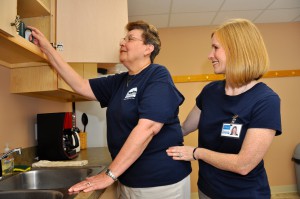
With the sun shining and temperature rising, summer has arrived. Heat related illnesses such as heat rash, heat exhaustion and heat stroke are quite common this time of year. For those who are “high risk,” such as the elderly or those with other medical conditions, now is the time to learn how to proactively handle the summer heat.
“While we are trained to spot the warning signs of heat related illnesses, we also emphasize the importance of teaching our patients to do the same,” said Therese Ganster, Community Liaison, Peninsula Home Care. “The threat of heat related illness is constant. Home health care is even more effective when patients can identify when they have symptoms and ask, ‘could I be at risk for this condition?’”
Remembering six simple steps can help avert or alleviate heat-related illnesses and issues:
- Staying healthy means drinking the right fluids. Water will keep the body hydrated and sports drinks will help replace nutrients, while alcoholic or caffeinated beverages will increase the risk of dehydration.
- Learn to recognize the symptoms. Dizziness and fatigue, which can be present in cases of heat exhaustion or heat stroke, are symptoms to be aware of, especially in times of extreme heat, or, during/after hot-weather activities.
- Prevention requires teamwork. Daily communication between seniors and their families is necessary to remain up-to-date on the senior’s well-being, especially if they are aging in place. If distance is a factor, video calls can help bridge the gap.
- Update home cooling systems, such as fans and air-conditioning units.
- Have a back up plan in case of a power outage. Whether it is for an hour or for a week, design a relocation plan to ensure the senior will always have access to a safe, cool environment.
- Research current medication. Ask a doctor or pharmacist how the combination of heat/hot weather activities and medicine can affect one’s health.
“Staying connected throughout the summer is more important than ever for elderly people who wish to live at home, independently—aging in place,” added Ganster. “The best thing a person can do is know the signs, know themselves and know the steps to take if they sense something isn’t quite right.”
About Peninsula Home Care
Peninsula Home Care ensures that all patients are involved in their plan of care and strives to give them every opportunity to maintain their independence in the home. The agency has served more than 35,000 patients on Delmarva and has been named to the “Home Health Care Elite” three times in five years. For more information visit www.peninsulahomecare.com.
Practicing Makes Perfect – Peninsula Home Care Occupational Therapist (OT) Megan Keglovits (right) demonstrates how OT helps patients learn everyday tasks while recovering from illness or injury. Keglovits is practicing with Debbie Straub, a PHCN administrative specialist who is playing the part of a patient during a training session at the company’s Seaford, DE office. Keglovits helps Straub reach into a cabinet for a glass for water. The session helps train therapists to keep patients hydrated and mobile in the summer months. Peninsula Home Care serves patients in Sussex and Kent Counties in Delaware and Wicomico, Worcester and Somerset counties in Maryland. For more information visit www.peninsulahomecare.com



